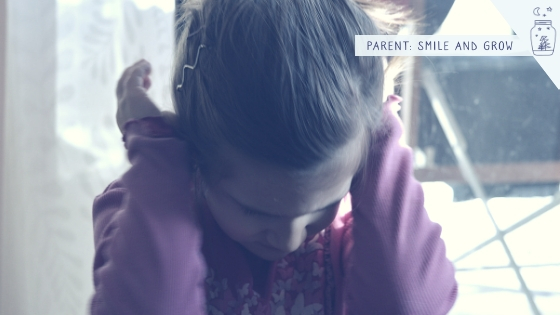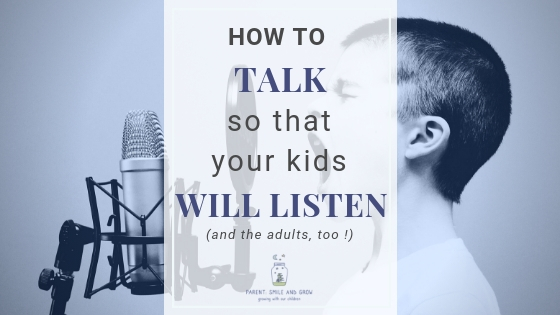Table of Contents
Talk so that your children will listen? A dialogue with no emergency exit

Stressed and worried, I’ve been sleeping poorly lately. I’m struggling to get my energies back, especially at night. I just would like to be left alone. But I have children who are also stressed and preoccupied. Their magic wand? Well.. Mom!
We have to get out. We’re late.. My brain is lost on these circular thoughts.
Stop it! Are you getting dressed? Go brush your teeth! But what makes you think that you can jump on the bed?! Stop it, I said! 1, 2, 3 you stop now!
I look at my watch. We’re late, one more time. Can you believe it! I’ve been waking you up earlier every day, and we’re late anyways !
I feel all my helplessness and my frustration mount. Except, of course, that it doesn’t make my kids move any faster.
When we finally get to the elevator, I take a deep breath. I look at my half-asleep children, their eyes full of a mix of sadness and fatigue.
My motherly tenderness replaces the Panic of infinite delay, and behold, I feel guilt rise. Why do I end up screaming like that? I know it doesn’t work. And yet I have tried everything!
How can you make your children listen? What’s wrong with the way I communicate?
Change yourself before changing others
There is only one corner of the universe you can be certain of improving, and that’s your own self. _ Aldous Huxley
Very simple. When I realized that I was expecting my children to change, when I was the one having the problem in the first place, I had the first hint.
Because it seems simple, but it revolutionizes everything: instead of moaning because things do not go as we wish, we become responsible for them.
I can intervene and find a solution, instead of waiting for external conditions to come true (i.e. my children growing up, becoming more self-sufficient, my partner dealing with the situation, etc.)
I can’t change my kids. On the other hand, I can’t stand talking to the walls anymore! Does it ever happen to you? this feeling that no one is paying attention to what you have to say?
While I wonder about my children’s faults and their possible causes, one thing strikes me: If someone had invaded my beginning of the day by throwing at me all the things that I just swayed to my kids, I would not really want to cooperate or respond nicely .
I have to start from my inner self again. (Becoming a parent primarily means working on ourselves, doesn’t it?)
Hey! If you want to receive more inspiring content, it’s over here!
To make your children listen, check your expectations
Asking a 3 year-old-child not to move or to laugh aloud is quite contrary to his nature. I read a very interesting article about it, written by blogger and parenting expert Lauren Tamm, who suggested that one of the reasons why our children don’t listen to us is because we don’t make them move enough and play outside.
She explains that according to Angela J. Hanscom, a pediatric author and occupational therapist, a 3-year-old child would need free movement and outdoor play for 5 to 8 hours a day. The physical challenges that children encounter when playing and taking risks, help them to master their bodies, developing their vestibular senses and proprioception.
What is that?!
-
The vestibular system regulates the sensations given by our body while it moves.
-
The proprioception refers to the perception of the position of our different parts of the body.
Our children learn to concentrate, listen to us and remain quiet, only once they develop both their vestibular senses, and proprioception. The two are usually formed before the 6th birthday, through physical experiences.
Well, 8 hours of outdoor play is quite unrealistic, however it is true that if we replace them by hours of sitting – be it in class or in front of a screen – the need for activity will emerge afterwards, when we ask them to sit at the dinner table or to avoid transforming our bathroom into a swimming pool.
(I solved this problem by letting my kids wipe. They always take the bathroom for a pool, but at least it’s not up to me to do the job).

I tried to put myself in my children’s shoes, with all my empathy and understanding. I wake them up smoothly, but 3 minutes later, I start asking them to “do fast”- now, do fast makes no sense to them, since they haven’t figured out what a minute or an hour involve yet.
And it is much more interesting to dance and sing between a pair of trousers and a sock, instead of dressing mechanically as I try to teach them.. All right. But then shall we forget the rules?!
Connected: The importance of rule-setting for happy children
Feel like we could keep in contact? Come on in 🙂
When “make your children listen” rhymes with “give orders”
If most of our conversations with our children are made up of orders, talking to us doesn’t really sound exciting, does it?
At home, there is this moment of magical tranquility when we have breakfast, and we tell each others about our dreams. The three of us sitting at the table, the head still leaning on the arm, between a spoon of milk and the next, we are actually together.
I see myself, however, while starting to “Come on, look at the clock! Finish your breakfast! Go get dressed!”
The link breaks, I feel it now that I observe myself from the outside. The ears are no longer listening.

First change: Talk with each other, instead of talking to each other. Observing, listening, being together. Have a conversation, instead of a command machine gun.
I move to my room to get dressed, and when I come back, my daughter is under the duvets. What are you doing here? Don’t stay in bed!
Second change: Not only do I give orders, I put them to the negative form: don’t do this, don’t do that.. Enough to organize an insubordination! Indeed.. What if I turned my sentences to positive?
When “make your children listen” rhymes with “criticize”
I’m going to the bathroom. My daughter whines and follows me. “How is it possible that you’re incapable of getting dressed by yourself?!”
We’re switching to heavy criticism. I see my words entering through one ear and coming out of the other, with the only effect of breaking a little my daughter’s self-esteem, but not having convinced her one bit to get ready quickly and independently.
You never do what I ask!
You you, you — and no answer from the other side. OF Course!
Third change: I bite my tongue. Yes, you really have to shut up, breathe, take some time; And then, reversal of trend! You should talk about yourself (we’ll go back to that in a sec).
Connected: the importance of breathing correctly !
When “make your children listen” rhymes with “yelling”
Well, I’m at the end of it.
We have to get out! You want to go out in your pajamas?
And then it comes out (I’m not the only one to crack, reassure me!) I’m yelling.
Because I want to leave on time, because I’m tired, because as soon as I get away, the kids start playing or singing and they forget what they were doing, and then I have to run!
Except that yelling, in the best hypothesis makes my son cry, and in the worst, has no effect. Just to break the mood, while my kids were just doing their job: playing.
Fourth change: Sleep a little more (oh yes!). Delegate whenever it’s possible! And keep your loud voice for emergencies only. Apologize when we can’t help it – it will still happen, we’re human.

When talking so that children will listen implies that you change
Lost in the analysis of our own points of view, we quickly forget to consider that a conversation is not the fruit of just one person; And that talking so that your children will listen, or any other person for that matter, implies establishing an empathetic connection.
This is particularly true with children, who have a still immature neocortex (the part of our brain managing rational decision) but do have a much pervasive limbic system (where emotions and memories are handled).
If a friend replied to your confession of grief with a reproach like :
“but what is wrong with you?! Haven’t you figured it out yet ? You’re being ridiculous!”
Probably she wouldn’t be your friend anymore.
Often, we ask our children to “listen to us”; when we do not listen to them; and we don’t make too much effort to communicate in a way that makes us be heard.
Let me explain. We have seen that the child, before his 5-6 years, does not see reality at all as we do.
Connected: you child’s social development and theory of mind
Listening and understanding
In addition to this, his understanding of his own emotions and their expression is still limited (let’s be honest: sometimes it’s difficult for us too!).
So they express a lot with their bodies. Every gesture is a message, more or less hidden, that we need to understand; and if possible, explain to him.
(Sign-up to Lauren Tamm’s free email course on how to teach your kids to listen, it’s very informative! I loved her ideas, some of which I shared here.)
I know that it’s very hard to think about encrypting a message when your child kicks you as you try to get him dressed; Or when he throws himself on the ground screaming in the middle of the sidewalk.
Listening means understanding the hidden need of our child, who generated this explosion of emotions, expressed through his behavior- in a rather contrary way as to what we’d asked.
It also means understanding our own need, and learning to express it to the child, instead of only sending him accusations or criticism.

I listened. I put myself in the shoes of my little ones, who have no desire to hurry and leave, who just want to snuggle up against me and take their time. And who have to deal with a mom who puts pressure on them while it’s still dark outside. Not funny, is it?
I admit, despite my efforts, it took me months to really get back and see the other side of the situation. But any profound change takes time (and will be very effective in the long run!).
Connected: how accepting your children’s emotions will make you a happier parent
How to talk so that others will listen – examples
Speaking for oneself, instead of accusing or giving orders, offers many advantages:
-
When we accuse someone, the other person will tend to get defensive, instead of listening and executing our request. When we talk about ourselves, our needs, and the needs of the other, we create empathetic connections; We care about our relationship. This is true for children as for adults!
-
When we give orders, we basically have no way of obliging the other person to obey. Yes, we can threaten, and punish. And our child will end up (perhaps) by yielding out of fear or shame (which is not great neither for their self-esteem, nor a healthy relationship with us, nor their brains). On the other hand, if we talk about us, and what we are going to do, there we have the power to intervene (because, remember, we can’t make the other person change at our will!)
Connected: the link between kindness and empathy
One drawback: it is more difficult to put into practice. We are not used to it, so we have to think about it instead of launching our autopilot.
My advice? Practice with one situation at a time. Memorize some of the phrases below, and work on one or two that work well for you and your situation, before moving on to the next one.
Why not joining our community of parents for mutual support ?
Into practice: some sentences to use
Instead of, “Would you stop moving! How do you want me to dress you up if you move like that?!”
You can say, “I see you’re agitated. Maybe you’d like to play instead of being in a hurry like that? We can do it like this: I count to 10 and we see if in the meantime we can wear pants and T-shirt! And if we get there, play one game of hide and seek! Is that okay?”
“That’s not possible, you’re still in your pajamas! I asked you to get dressed ten minutes ago! What are you doing here? You’re 5 years old, it’s not possible that you’re not even able to get dressed on your own!”
You can try it with: “You know, when I see you’re ignoring my request to get ready and you’re just hanging out in your bed, I feel a lot of frustration and anger. I really need to be on time in the morning. What can we do to get you dressed by yourself? Do you want me to take care of you, because it bothers you that I help your little brother but not you? I do also want to spend time with you, but I’d rather play together once you’re dressed. Okay?”
Another situation: “You really don’t eat anything! I prepared this for you! Do you know how many children have nothing to eat?”;
Can be replaced by: “You can eat anything that’s on the table, you can choose! Take your time. I’m going to clean the table when the clock is… I’m eating now, because I want to make sure I don’t get hungry before the next meal! I want to have all my strengths to be able to play.”
“Get up, and come and have breakfast, we’re late! You can go to bed sooner next time!” sounds better like this:
“Do you want me to take you in my arms and bring you to the kitchen, or would you rather get up on your own at your own pace? I’m leaving breakfast on the table for another 10 minutes.”
Some practical instructions to make your children listen
-
Put yourself on your child’s level, look him in the eye, search for a contact. Don’t yell from the other side of the apartment! Children have a limited peripheral vision. If they are playing, they forget everything else, but not out of bad will!
-
Express your demand in a positive way.
-
If need be, manifest your need, your emotion, and make your request
-
Also verbalize the need of the child, to show him clearly that you understand him (it will also help him to clarify to himself his own sensations)
-
Keep your calm if you can; otherwise, apologize later!
-
Try all the techniques of collaboration: play a game, offer a choice, throw a challenge..
-
Prepare your child before each new step: if he is playing, warn him 5 minutes before he will have to stop to move on. Use a timer if needed, to give him a way to check the passage of time by himself
-
Involve him in the constitution of a routine. There are different ways to do this, with maps, drawings.. What I personally tested: take a piece of paper, sit down with the kids and ask them. What do you need to do to prepare yourself before you go to bed? I wrote what they told me, and my daughter made matching drawings next to each text. We then chose a conspicuous place to hang it, and every night I ask to go check the list. For 5-year-olds and up, it works very well!)
-
Which brings me back to: instead of giving orders, ask questions. What do you need to go to school? What do you think you need?
Connected: 5 Secrets to get your children to cooperate

Shall we do it again?
I know, getting up in the morning is very hard. I understand, I had trouble getting up too. You’d like to play a little more with me instead of getting ready to go to bed. I see you’re angry. But you see, I feel angry, too, when I see you’re not getting ready, because I feel like I have to do everything myself, and you’re not helping me. So, I think we could spend some nice time together if we collaborate.
Yes, talking in a way so that children listen, sometimes requires more preparation time. You have to think about resting, asking, stepping back. It requires you to think about your own needs, which is not obvious.
But here it is : talking for children to listen involves weaving real bonds, with yourself, and with your entourage. You’ll see: It’s a good workout to improve your communication skills with adults too!
Because when we change, everything changes.
Resources and references
I share with you some articles that I have taken as a reference, and useful readings as always! Links to Amazon in this page are affiliate links.
But first, I ask you 3 things:
-
Share this post if you found it useful!
-
What do you think? I’d really like to hear about your experience 🙂
-
You liked the article and you’re interested in joining the club and receiving food for thoughts and inspiring suggestions directly in your inbox? It’s over here!
Articles:
-
Practical tips with a psychological explanation from the leading website “Psychology Today”
-
Many resources and an important explanation on how to tap into the kids’brains, from a blog I truly love and use as a guide
-
Controlless Parenting. Never heard of that? I hadn’t. But I like the way it is explained, and how it teacher children to make their own decisions. Let it go!
-
This is a very practical guide on how to deal with “children’s selective hearing”. Which also means our body language, tone of voice, our words.. Very interesting!
Books:
-
I haven’t read [eafl id=”2156″ name=”The 28 Day Tame Your Temper Parenting Challenge” text=”this book”] yet, but I like the idea of using a challenge to implement those new ways of thinking and dealing with our anger and our children’s behavior!
- I just added [eafl id=”2157″ name=”No-Drama Discipline Workbook: Exercises, Activities, and Practical Strategies to Calm The Chaos and Nurture Developing Minds” text=”this workbook”] to my wish-list. Truth be told, I really like Daniel Siegel and always feel confident in suggesting his books; and I particularly like the idea of a workbook as it really helps to implement what you’re reading straight away.
-
Given the title of my article, I can’t leave this guide for parents aside: [eafl id=”2155″ name=”How to Talk So Kids Will Listen and Listen So Kids Will Talk” text=”How to Talk So Kids Will Listen and Listen So Kids Will Talk”]. A revisited classic!


This post hits home. I try so hard to be aware of the way I’m talking to my children. I do find in the morning is when I talk at them the most, but since I’m catching myself with the negative sentences I’ve started to become more aware of how often I used to use them. Well, I’m not perfect, but I try!
I know, it is so so hard to change our habits, even with the way we talk! It really took me months (and I’m actually still in the process) to stop the constant flow of yelled orders – I guess I just hate being late and it drives me nuts to get anywhere late, but still.. definitely not the best technique to get my children to comply! LOL BUT – you’re very right : we can’t be perfect anyways, the most important thing is always trying to do better I think